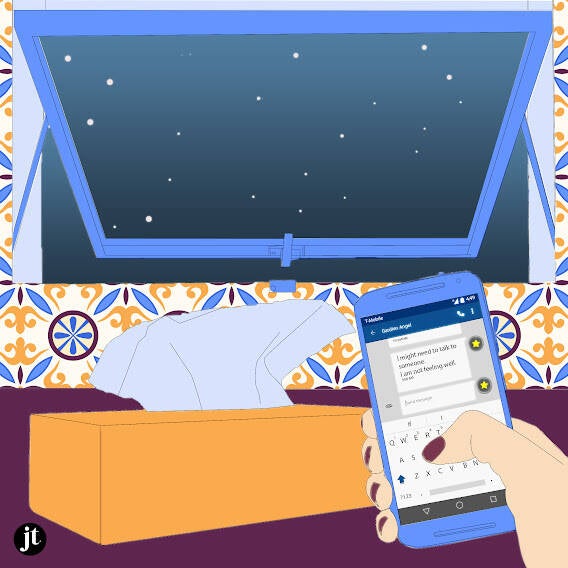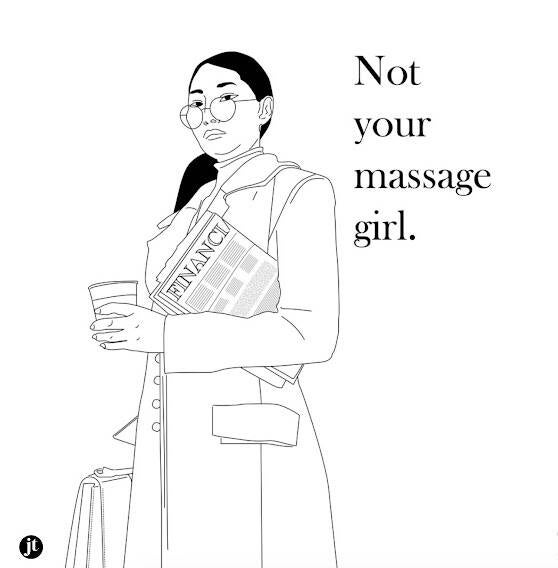Guest Writer/
Julieta Tenreiro:
Drawing for the Silenced

© Julieta Teneiro, Paris, 2023
About the author:
Julieta Tenreiro is a graphic designer and illustrator living in Paris since 2013. Born in Lisbon, Portugal, where she first studied Visual Arts, she moved to Paris to pursue her studies in Graphic Design, UI UX design, and Editorial illustration and now completing a degree in Art Direction.
After a few agency and company experiences and other different previous jobs, she’s been working as a freelance designer and illustrator, passionately being able to choose her projects but also having more freedom to invest in the artistic side of the illustration.
“It’s through art and illustration that I feel the freedom to be somehow political. This is my tool to speak out and describe the world around me and parts of my own experiences. The world is too unfair, it has more than enough material to inspire, and it's impossible for me to just make things pretty. There's no time for that."
Most of these illustrations are also published on social media as it seems to be a more efficient way of spreading the message and raising awareness.
How everything started…
Growing up in a patriarchal, dysfunctional, conservative family, with no support of my artistic choices, things haven’t always been easy. The path of pursuing my dreams and projects was always lacking support, especially after moving to France, where I realized that artistic and intellectual recognition of a foreign, Portuguese woman, past the age of 30, was almost nonexistent. The French are used to seeing the Portuguese as builders or cleaners with poor critical thinking, and not as intellectualized people. With persistence and passion for what I do, connecting to the right people, studying more and more, and obtaining French citizenship things started to change, even though the road to recognition was still long.
“Apart from being seen as a potential cheap worker with a Portuguese accent, nobody was interested in the real matter I could provide. But then I thought: what if these issues become the material of my creations? I cannot accept that others tell me where I should be good at, I know where my place is, and my place is where my passion is.”
Storytelling about many forms of oppression, discrimination, stigma, and precarity became the baseline of my creative work. From the social female condition to racism, xenophobia, homophobia, mental health… Giving some voice to those who suffer in their daily lives from the consequences of society's dysfunctionality became my source of inspiration.
I’m also someone deeply observative, which helps me collect visual information but also analyze the events and people around me to create my illustrations and choose the subjects that I find important.
Raising awareness about mental health

© Julieta Teneiro: Snap out of it, digital illustration, 2023
This illustration is for all those millions of people struggling with mental health who heard the famous words “Snap out of it!”... I remember the first time I tried speaking to a partner or my mother about my struggles and receiving “You should have a glass of milk before bed to solve that '' as a reply. The tip obviously never worked. Hardly any of my siblings were able to say, “I am here if you need me.” Of course, drawing, medical help, doing passionate activities, and surrounding myself with the right people were starting to be more effective than any glass of milk.
I also knew that as an introspective woman who doesn’t like to correspond to the clichés of a traditional family-oriented woman, who loves freedom and drawing outdoors would be a problem: for my security and the way others see me, but I had nothing left to lose. All I had left was being myself and free. There is a price you pay to claim your place of freedom in society, as the real "you" is never embodied without falling and being blessed multiple times.
“The more we bring up the subject, the better we’ll overcome it… - I thought. I’ve always said that the best way to deal with a sensitive issue is to normalize talking about it. As an introvert, the best way I have to represent it is through drawing.“
So I draw and explain the suffering of each one of us according to every person I’ve encountered, but also through my own experience. Exchanging with mental health professionals also provided me with a bigger understanding of struggles that come with mental health issues.
Most of these illustrations started as sketch ideas on paper and were then executed in image editing software programs. The symbolic side of the elements and the environment chosen are as simple as possible. The patterns used to enrich the image are frequently linked to my cultural past, like the Portuguese tiles.

© Julieta Teneiro: The Guardian Angel, digital illustration, 2023
The Guardian Angel is about social isolation, people disconnecting from each other, and the lack of emotional support. For those who live with depression and anxiety, and even for everyone in general, having someone to rely on is an important part of keeping a fulfilled life, but also vital for dealing with more delicate issues, like suicide prevention. It is also about the fact that we should pay attention to one another, help one another, especially as females facing a higher risk of insecurity in the private space such as domestic violence. An attentive eye to those around us can be a life savior.
This, of course, leads us to the next topic, one of my favorites: the female condition.
The Female Condition

© Julieta Teneiro: Eve, digital illustration, 2020
Eve is the symbolic figure of a woman’s demonization. Like in most religions, this demonization has been going on for generations, and has been applied to some strong independent female species like snakes or spiders as well. The character in my illustration is in symbiosis with these animals, assured, in tune with nature, and with no concerns about her body. She’s challenging what’s expected from her in the Bible. The choice of colors of both pink and blue tones is of course a reference to social gender clichés.
Women's condition in history was highly influenced by the patriarchal side of most religions. The lack of recognition of their capacities or simply of their wholesomeness as human beings, has always been deeply affecting them.
Much of my work is also about honoring the forgotten or not enough recognized women in history and exercising critical thinking about religion and its impact on women’s freedom, without the need of corresponding to strict social criteria of an idealized sterilized human being that in reality will never exist.

© Julieta Teneiro: Under the Grip, digital illustration, 2023
Under The Grip illustration is the picture of what a patriarchal society demands of a woman to tolerate. Living internally with all typical common forms of abuse in heterosexual relationships, many women grow up believing that they’re the ones who must constantly question themselves, no matter how much abuse they experience from their partner. Being under the grip of a partner is a very common phenomenon in situations of domestic violence, meaning under all forms of violence, like emotional, financial, or physical abuse. It can also be more subtle, through the belief of constantly being the reason for the abuse, to the point that an equal relationship seems impossible. It’s also the portrait of a woman’s pressure to keep up the appearances of her couple.
Domestic violence, as a serious issue in our society, is something that I’ve acknowledged all over the place. This form of psychological, physical, or financial oppression, I’ve seen around me, in my family and among siblings, within most women’s households. Becoming too normalized with little action, I thought it would be urgent to raise awareness about this.
Working with the richness of line patterns and pastels allows me to provide some diversity to the composition, however, the most important to me was to work on their eyes and looks, their facial expression, and the environment.
About equality

© Julieta Teneiro: Not your Massage Girl, digital illustration, 2022
Not Your Massage Girl illustrates the lack of equal opportunities based on women’s origins in general due to clichés or simply their skin color. After exchanging with other women in different conditions such as black, Asian, or even Eastern European, the negative impact seemed to be the same. Also, I tried to bring up the subject of “postcolonial syndrome”, responsable for the collective imaginary of an Asian woman seen primarily as a massage girl, or the African woman as a housekeeper instead of a lawyer. The fetish of the exotic, almost inexpressive woman in the heterosexual male’s imagination is also quite usual. No male wants them as the intellectual, strong character or independent woman in his fantasies.
For example, in my first few weeks in Paris, I wondered why black people rarely had comfortable financial conditions, contrary to white blond people, who always seemed to be part of rich families and benefit from intergenerational wealth.
For these drawings, I started by sketching the ideas in my notebook but then used my tablet to draw vectorial.
“Not your…” definitely is the refusal and setting boundaries to the idea of becoming objectified.
So much yet to draw about!...
I urge for change. I will still try to honor the female condition in society as my main subject ,as long as it feels so unresolved. However, I’ve seen many other topics I wish to bring to the table, like ecology and ethical treatment of the animals: our relation and respect to nature is something so neglected that I find it urgent to draw. The contact with animals and nature has always been one of the most positive encounters I’ve had to find inner balance and learn the best lessons in life, so I owe them some drawings!
“The challenge is surely to find the best composition possible to communicate and raise good questions about such an important matter, and that is always the hardest part of my work: Which elements should I introduce? Which characters, what should they look like? What's their mood? Which environment? This early brainstorming stage is usually the longest and the hardest before the execution of the illustration.”
More about Julieta's work:
Portfolio on instagram:
https://www.instagram.com/julieta_tenreiro_art
General website:
https://www.julieta-tenreiro.fr/
Add comment
Comments
Nice article! I feel through this article and drawing my own experiences in certain level.